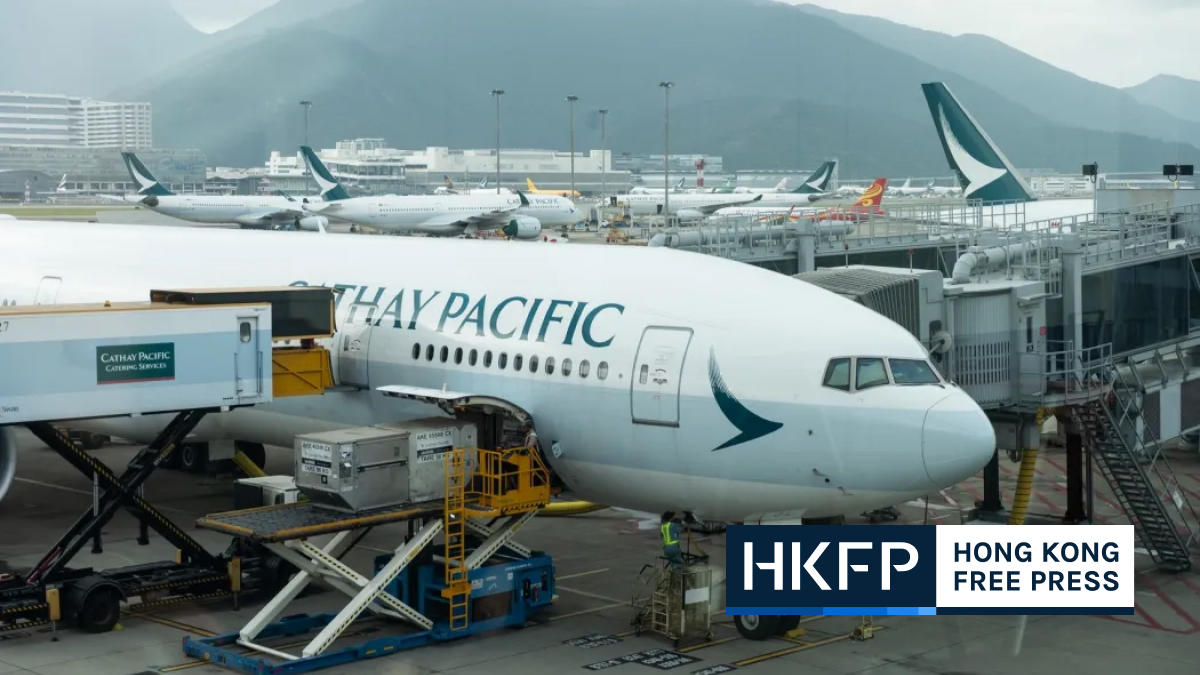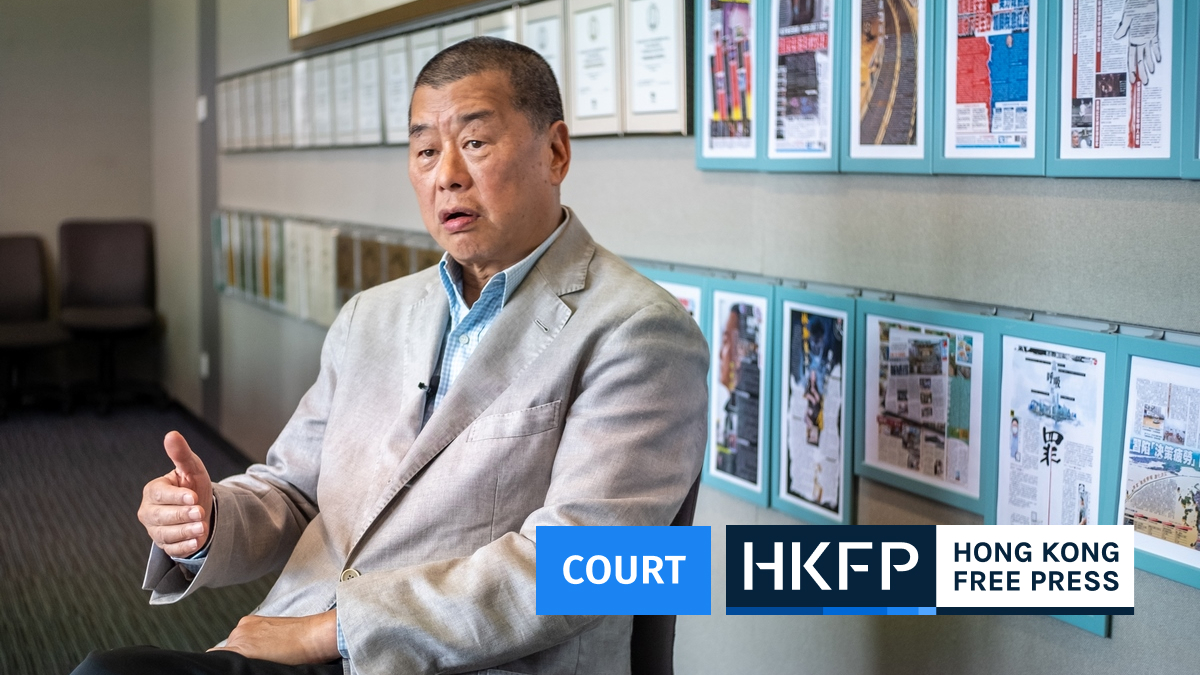While they are the backbone of many Hong Kong families, issues faced by migrant domestic workers often go under the radar in the city, with many turning to their own communities for support in the absence of official assistance.
But during the Covid-19 pandemic, those issues rose the surface as the city faced unprecedented challenges to its healthcare system and administration.
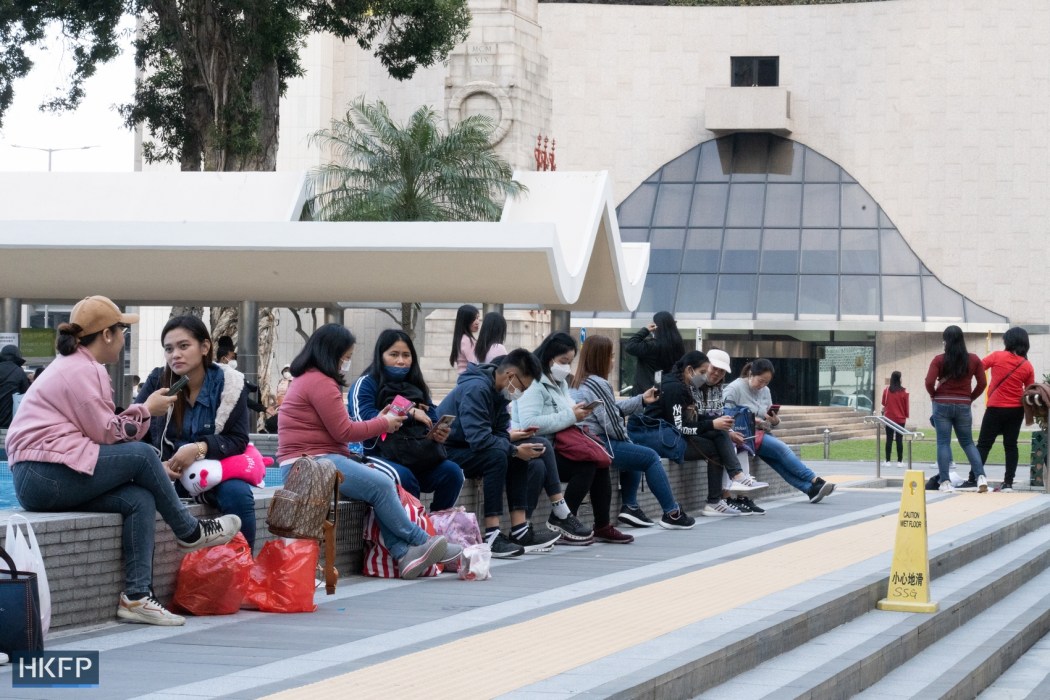
With Monday marking the third anniversary of the city’s first confirmed Covid-19 infection, an NGO focused on the city’s migrant domestic workers said there were lessons to be learned from the epidemic-era as Hong Kong begins to resume some sense of “normalcy.”
Ousted and fined
Manisha Wijesinghe, executive director of HELP for Domestic Workers, told HKFP that while the landscape of the pandemic has changed after three years, the issues faced by migrant domestic workers remained.
HELP directly aided over 800 domestic workers in the span of two months during the fifth Covid wave last year, when the organisation saw a “large surge” in the number of workers needing assistance, especially for those who tested positive for Covid-19.
Infections rose exponentially in the early months of 2022, peaking at close to 70,000 cases per day in March. As a result, Hong Kong’s healthcare system was paralysed, with patients left waiting on hospital beds outdoors in the cold.
In February last year, HKFP reported that a Filipina domestic worker, J, spent two nights on the streets after testing positive for Covid-19, before HELP assisted her with finding accommodation.
J’s case was not unique.

Although quarantine in a government-run camp was mandatory at the time, with facilities overwhelmed by the sheer number of cases, many Covid patients ended up recovering at home before the authorities were able to arrange isolation.
However, this left some domestic workers with nowhere to go after becoming infected, having been told by their employers that they could not live with them while carrying Covid-19, even though it is legally mandated that migrant domestic workers must live in their employers’ home for the duration of their contract.
It was one of HELP’s missions to find displaced workers a roof over their heads, and the organisation had to race against the clock to do so.
“If somebody tests positive for Covid, you need to find support within the next couple of hours,” said Wijesinghe.
“Because if not, they are a public health [risk] as well, if they are, you know, sitting in a park or sitting outside, in a coffee shop or something like that. So that was something that we definitely had to face.”
As part of its stringent anti-epidemic regime, the Hong Kong government initially imposed a HK$2,000 fine for breaching related rules, an amount that was eventually raised to HK$10,000 for violations including missing mandatory Covid-19 tests.

Dozens of migrant domestic workers fell foul of the restrictions during the pandemic, especially those arriving in Hong Kong, who faced ever-changing testing requirements that were confusing for many.
Additionally, the HK$10,000 penalty could mean parting with more than two months’ salary for domestic workers, whose minimum monthly salary was increased by HK$100 to HK$4,730 last October.
The Hong Kong Federation of Asian Domestic Workers Unions (FADWU) told HKFP that they had helped with 37 cases and all workers got their money back or had the fine revoked.
FADWU said it was difficult for migrant domestic workers to navigate the latest restrictions, and that they had demanded the authorities revoke fines for all migrant domestic workers, saying that policy information was not provided in languages that workers would understand.
The federation also distributed medical supplies such as facemasks to domestic workers, many of whom said their employers did not provide masks or hand sanitiser.
‘Singled out’
The pandemic also exacerbated discrimination against migrant domestic workers, who were often “singled out” and portrayed as “people who were spreading the virus,” Wijesinghe said.
Domestic workers in Hong Kong are allowed one day off per week, usually on Sundays. However, during the height of the pandemic, employers often demanded that workers stayed in during their rest day. Some pro-Beijing lawmakers urged the government to consider a “lockdown order” for migrant domestic workers.
“If you looked at the numbers, especially like vaccination numbers… you saw that it was domestic workers who were some of the first communities to take the vaccination in large numbers,” said Wijesinghe.
“And in fact, they were some of the frontlines in terms of fighting the virus… They were the frontline in our homes.”
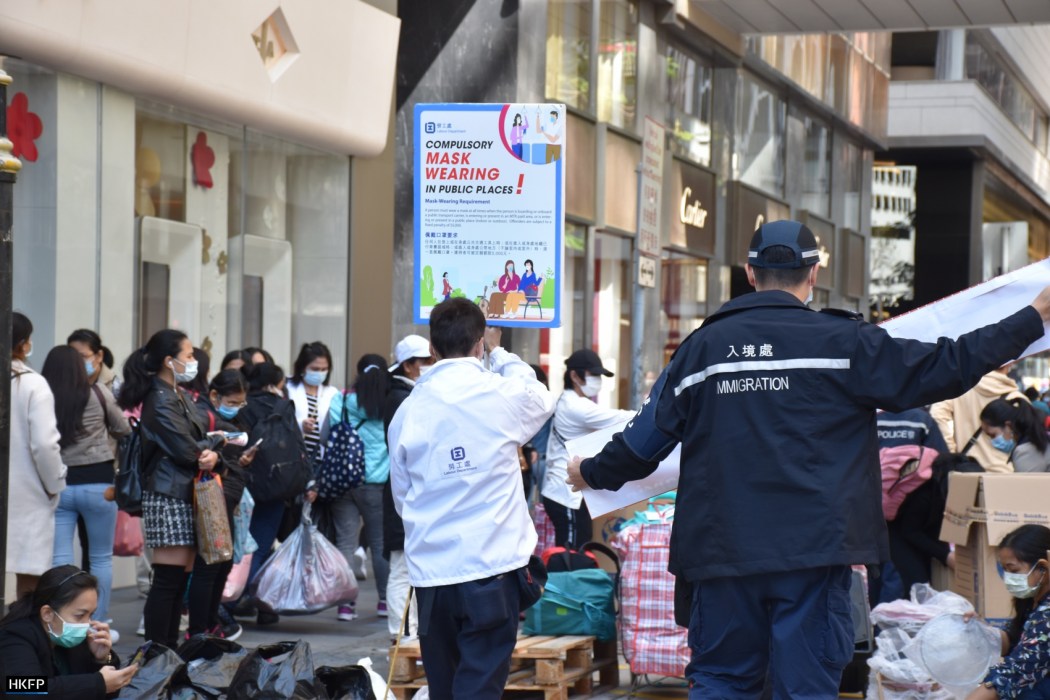
Government policies, including the launch of quarantine hotels specifically for arriving migrant domestic workers and compulsory testing targeting only domestic workers, were criticised as discriminatory.
According to a survey released by the FAWDU in June 2020, 83 per cent of respondents said they felt discriminated against.
All domestic workers in the city were ordered to take a Covid-19 test in April 2021, after a single worker was diagnosed with two mutant strains. The government also announced plans to mandate vaccination for domestic workers, but the decision was scrapped following outcry and a diplomatic tussle with the Philippines, where a lot of Hong Kong’s migrant domestic workers hail from.
Police officers and government workers were often deployed to enforce social-distancing rules in areas where domestic workers tend to gather during their day off, such as pavements and parks, often because they have nowhere else to turn to take some rest.
“When we demand for labour protection and so many times calling for joint-departmental government effort, it’s so hard, But against us, fining us, the government is fast,” Phobsuk Gasing, chairperson of the FAWDU, told HKFP.
The Labour Department told HKFP that it “does not and will not tolerate any discrimination” against migrant domestic workers, and that the government had been enforcing Covid-19 regulations “across the territory and among all groups” including migrant workers.
Anti-epidemic information, as well as information on the responsibilities and rights under the Employment Ordinance and the Standard Employment Contract, were also given to employers and domestic workers, the department said.
Domestic workers were also excluded from the government’s consumption voucher scheme, which was established to stimulate the economy during the pandemic.
The programme was one of the many welfare policies that omit migrant domestic workers.
Domestic workers cannot be granted permanent residency in Hong Kong, even if they stay in the city for more than seven years – which is the case for most foreigners. The city’s minimum wage, which was recently proposed to be increased to HK$40 per hour, does not apply to domestic workers, either.

“Domestic workers were right there, sometimes very much at the frontline fighting the virus, despite the fact that sometimes the narrative was framed in a way that it was domestic workers who were not being very careful and spreading the virus,” said Wijesinghe.
Mental health impact
The Covid-19 pandemic gravely impacted the mental health of many Hongkongers, and migrant domestic workers were not immune, said Wijesinghe.
While employment instability during the pandemic was not unique to domestic workers, the marginalised group faced additional challenges imposed by travel restrictions and stricter visa processes.
For much of the past three years, Hong Kong maintained one of the world’s strictest Covid-19 travel policies, at one point mandating 21 days of quarantine at designated hotels. For a period, a limited number of hotels were assigned for migrant domestic workers to quarantine in, with a 21-day quarantine costing up to HK$13,000.
The cost, vaccine requirements and entry rules – along with a shortage of quarantine hotel rooms – made it difficult for workers to come to the city.
“Many workers [were] stuck in their home countries for months. Employers are frustrated [because] the workers they [hired] cannot come,” said Gasing.

The administration also intensified its crackdown on “job-hopping,” which the Immigration Department describes as domestic workers “prematurely terminating their employment contracts for change of employers.” According to FADWU, the Immigration Department denied 2,833 visa applications from migrant domestic workers suspected of job hopping in 2021, a drastic jump from the 319 denials the previous year.
The group said last August that many foreign domestic workers were “trapped in abusive employment situations that they feel they cannot escape,” as they were denied the right to change employers.
While confirming the figures, the department told HKFP that it refused 1,760 visa applications on the same grounds in 2022, and said that potential employers or migrant workers could “make a request for reconsideration along with any fresh information” if the visa application had been refused.
The health of domestic workers’ families in their home countries added to the pressure they felt.
“The stress came with families back home testing positive, we had a number of workers losing family members and not being able to go back to visit them or go back for the funerals,” said Wijesinghe.
Lessons to take away
While the pandemic has wreaked havoc in the city, claiming over 13,000 lives, HELP’s executive director said there were ways it could be seen as a “blessing in disguise,” as it highlighted the importance of migrant domestic workers.
The pandemic also brought out the “power of community,” said Wijesinghe.
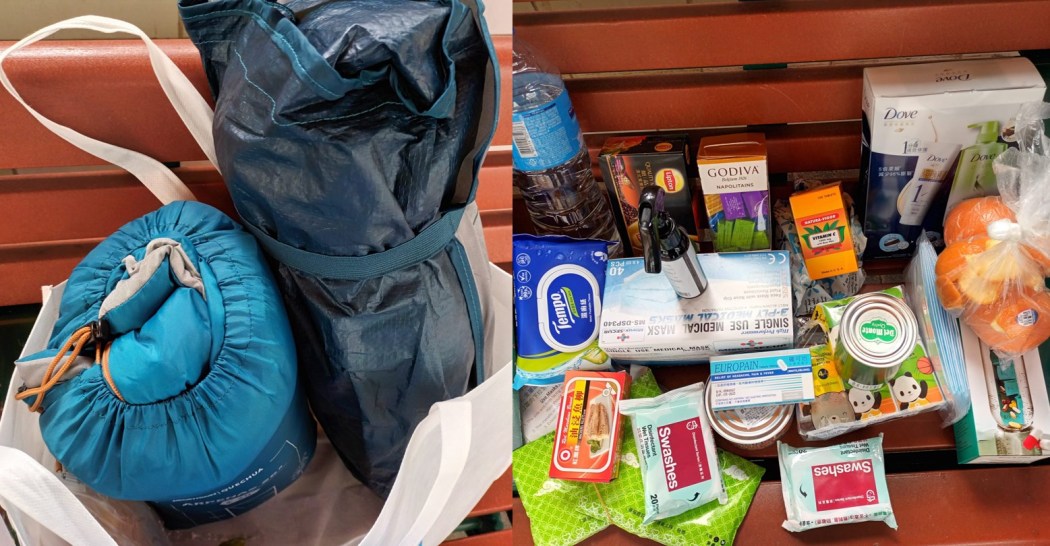
“With the fifth wave, HELP had a public call for support – to support the domestic workers who are homeless – and saw an overwhelming level of support from the local Hong Kong community, people who we hadn’t otherwise engaged with.”
Going forward, the executive director said there were lessons to take away.
“We want to stress upon the fact that domestic workers, they’re not a foreign problem. They’re not foreign to Hong Kong, they’re part of the Hong Kong community. And we are able to do amazing things by coming together.”
Addressing issues early on “before they become a larger problem” is part of the solution as well, according to the executive director. For a long time, problems faced by migrant domestic workers had been seen as something that should be dealt with by their own governments.
“But what we saw with pandemic was, if you don’t take care of domestic workers, that’s going to be an impact on the wider Hong Kong community.”
Support HKFP | Policies & Ethics | Error/typo? | Contact Us | Newsletter | Transparency & Annual Report | Apps
Help safeguard press freedom & keep HKFP free for all readers by supporting our team


